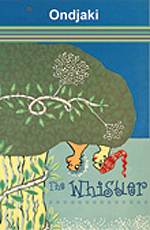The premise
of the book is simple enough: what if a man arrives at a village
with a musical gift so sublime that the sound of his music brought
people to tears? In the book that is named after this musician,
Ondjaki tells us precious little about the whistler that stumbles
into a small community church in a soaking rain... We do not know
his given names for instance, and when the dreamlike novella ends,
we will not recall much by way of his physical features; which is
fine really, because the book is more about the whistling
than the whistler.
The whistling will make rather more of an impression,
both on readers and villagers - who were not quite aware how much
joy was missing from their lives until the other-worldly whistling
arrives. The location is a regular village, with a parish priest
who was partial to his privacy, a widow who was attracted to a grave-digger,
a travelling salesman, and a herd of venerated donkeys that was
to the villagers what cows were to Hindu India. The donkeys could
not have been the asses of myth either, for they seemed to know
when the biennial donkey festival came around... and how to choose
the most blessed of their number as sacrifice for the wellbeing
of the rest.
The Christ metaphors multiply: the Whistler arrives
like a latter-day Christ, to the scoffing of the Pharisaic gravedigger,
KoTimbalo (who will presently make a speedy conversion to the cause),
he spat again."As well as he may whistle,
never in my life have I heard of whistling in the church!"
he began scratching his head, his hair. " What does the Bible
say about this...?"
Ondjaki is not telling either, but the book is
heavy with allusions. KaLua was the village man-who-was-not-all-there.
He was of unbalanced memory, went every where with rolls of toilet
paper and ‘liked to do the necessaries in the open air.’
He was the simpleton, but the revelation of the book was given to
him to make:
‘Okay, I’m only joking…’
smiled KaLua.
‘Joking?’
‘Yes, when I said that it was the Lord whistling. That was
far too good to have been whistled by the Lord…’
KaLua smiled and squirmed as he backed away.
This particular gospel of the whistling is received
lustily by bird and man. The whistler takes up residence in the
church and the swallows and pigeons come religiously to service.
Every good service contains a call to arms and the termination of
the Whistler’s piéce de rèsistance breaks the
congregation maniacally out of church on the inspiration of love.
Yet, there is only so much accuracy that can be conveyed in non-verbal
communication, however melodic it may be, and the outpourings of
love that follow burst the levees of convention, the shroud of life,
and brings 30-year-old courtships to a head.
The story is in the hands of a confident writer.
Ondjaki of course has no means beyond prose to express the magical
nature of his whistler’s music, but his prose is toothed with
poetry and is not the limitation that it seems at first. The story
proceeds apace (with ideas-dense introductory quotes that tends
to overwhelm the short chapters)… but it does not continue
too long: the Whistler knows when to make his exit - before the
Jading — that fate that will overtake even the most heavenly
of music — sets in. Yet, the portents for the sustenance of
his miracles are good: the new ‘groom’ has proposed
a ‘sexual timetable, prudent and strategic, to be scrupulously
fulfilled with not more than two transgressions per month’.
Ondjaki has a discursive style but his digressions are fruitful.
His sex scene is related with humour, as by a retired kick-boxing
commentator. It will not win the bad-sex award.
Originally published in Portuguese as O Assobiador
in 2002, The Whistler was first published in English in 2008. The
time-lag suggests the chasms that still divide African literature.
This Richard Bartlett translation is one more, welcome, bridge.
 |











![]()
![]()
![]()
![]()

